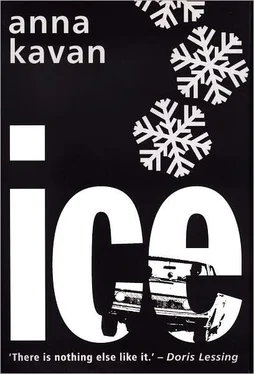We had to stop there until the ship came. I longed for something to focus my eyes on, there was nothing inside or out; no fields, houses, or roads; only vast quantities of stones, rubbish the bones of dead animals. Stones of all shapes and sizes were spread thick all over the ground to a depth of two or three feet often piled up in enormous mounds, which took the place of hills in a normal landscape. I managed to obtain a horse and rode ten miles inland, but the awful featureless scene did not change, the same derelict stony waste extended to the horizon in every direction, no sign of life or water. The whole country seemed stone dead, grey in colour, no hills except hills of stones, even its natural contours destroyed by war.
The girl was exhausted, worn out by travel: she did not want to go on. She kept saying that she must rest, begged me to leave her and continue the voyage alone. ‘Don’t drag me any further!’ Her voice was fretful. ‘You only do it to torture me.’ I replied that I was trying to save her. Anger showed in her eyes. ‘That’s what you say. I was fool enough to believe you the first time.’ In spite of all attempts to please her, she persisted in treating me as a treacherous enemy. Hitherto I had tried to comfort, to understand. Now her protracted antagonism had its effect, I followed her into the tiny cabin. She struggled, there was no room, the boat rolled, she fell from the berth, her shoulder struck the floor and the soft flesh was hurt. She cried, ‘You’re a brute! A beast! I detest you!’ tried to hit me, to struggle up; but I forced her under, forced her to stay down in that hard cold place. She cried out. ‘I wish I could kill you!’ began to sob and struggle hysterically. I slapped the side of her face.
She was afraid of me, but her hostility continued unchanged. Her white, stubborn, frightened child’s face got on my nerves. She was still always cold, although the days were gradually getting warmer. She refused my coat. I was obliged to watch her incessant shivering.
She grew emaciated, the flesh seemed to melt off her bones. Her hair lost its glitter, was too heavy, weighed her head down. She kept her head bent, trying not to see me. Listless, she hid in corners or, avoiding me, staggered round the ship, stumbling, her weak legs unable to balance. I no longer felt any desire, gave up talking to her, adopted the warden’s silences as my own. I was well aware how sinister my wordless exits and entrances must have seemed, and derived some satisfaction from this.
We were near the end of the journey.
The gay, undamaged town, full of light and colour, freedom, the absence of danger, the warm sun. The faces were happy. The sense of escape brought euphoria. The past was forgotten, the long, hard, dangerous voyage and the preceding nightmare. Nothing but the nightmare had seemed real while it was going on, as if the other lost world had been imagined or dreamed. Now that world, no longer lost, was here the one solid reality. There were theatres, cinemas, restaurants and hotels, shops where goods of all sorts were sold freely, without coupons. The contrast was staggering. The relief overwhelming. The reaction too great. A kind of delirium was induced, a mad gaiety. People sang and danced in the streets, strangers embraced one another. The whole town was decorated as for a festival: flowers everywhere, Chinese lanterns and fairy lights strung from trees, buildings floodlit, elaborate arrangements of coloured lights in the parks and gardens. The throb of dance music never stopped. Every night firework displays. All night long fiery stars and rockets burst in the sky, and sank reflected in the dark harbour. The festivities went on and on: carnivals, battles of flowers, balls, regattas, concerts, processions. Nobody wanted to be reminded of what was happening in other parts of the world. Rumours coming from outside were suppressed by order of the consul, who had assumed responsibility for the maintenance of law and order, ‘pending the restoration of the status quo’. To speak of the catastrophe was an offence under the new regulations. The rule was to choose not to know.
Remembering how I myself had wished to forget on another occasion, I understood the euphoric blindness without condoning it. I did not take part in the general rejoicing; I did not feel gay. I had no wish to spend my time dancing or looking at fireworks. Very soon I was utterly sick of bands playing and people in fancy dress. The girl loved all the gaiety, was absolutely transformed by it, her life miraculously renewed. Her weakness and lassitude vanished, she rushed to the shops, bought clothes and cosmetics extravagantly, visited hairdressers, beauty parlours. She seemed a different person. No longer shy, she made friends with people I did not know, drew confidence from their approval, became independent and gay. I scarcely saw anything of her; most of the time I had no idea where she was. She came to me only when she needed money, which I always gave her. For me it was an unsatisfactory situation. I wanted to end it.
I could not remain isolated from the rest of the world. I was involved with the fate of the planet, I had to take an active part in whatever was going on. The endless celebrations here seemed both boring and sinister, reminiscent of the orgies of the plague years. Now, as then, people were deluding themselves; they induced a false sense of security by means of self- indulgence and wishful-thinking. I did not believe for one moment they had really escaped.
I observed the weather carefully; it was fine and warm, but not warm enough. I noted particularly how the temperature fell after sunset, producing a definite chill. It was a bad sign. If I mentioned it, I was told this was the cool season. All the same, the sun should have had more power. Looking about, I found other signs of a changing climate. Plants in the tropi- cal gardens were starting to look unhealthy, and I asked a man working there why this was. He gave me a suspicious glance, mumbled an evasive answer: when I persisted, he pretended to hear the head gardener calling, and ran away. I commented on the chilly evenings to some townspeople I saw going about in peculiar wrappings. They were obviously unused to even this mild degree of cold, and possessed no suitable clothing. They too answered evasively and looked at me in alarm. In view of the new regulations, they probably took me for an agent provocateur.
An acquaintance of mine, employed in an official capacity by his government, stopped to refuel his plane. I made contact with him, questioned him about events elsewhere. He was uncommunicative. I understood the reason and did not press him. He could not be certain of my affiliations. Mistakes were not tolerated. An absolute standard of loyalty was demanded. The speaker of an incautious phrase would be eliminated, given no chance to correct an error of judgement. Somewhat reluctantly, he agreed to take me as a passenger when he left, but only as far as another island in the archipelago. I saw on the map that the island inhabited by the Indris was not far away, and, though I had decided to go back to my old profession, I promised myself a short visit to the lemurs before proceeding to the theatre of military operations.
I went to inform the girl of my plans. Earlier in the day, waiting to cross a street, I had been held up while a procession went past. She was at its head, standing beside the driver of a big open car decorated with parma violets. She did not see me, she had no reason to look. Her hair shone like pale fire in the sun, she was smiling and throwing violets to the crowd. It was hard to recognize her as the girl who had travelled with me. When I entered her room, she was still wearing the same parma violet dress; the delicate colour suited her fragile paleness, she looked extremely attractive. Her sparkling hair, sprinkled with silver and parma violets, had been touched with a matching dye; the slight touch of fantasy was especially charming.
Читать дальше












